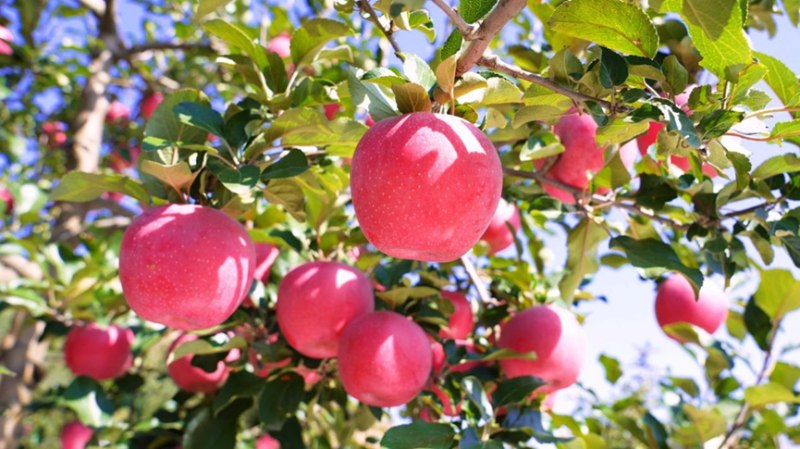
Located at 35°N latitude in Jingning County, Gansu Province in northwest China, this region is renowned as the "golden production belt" for apples. It has been designated by the former Ministry of Agriculture as the optimal area for apple cultivation on the Loess Plateau. With its high altitude, abundant sunlight, significant day-night temperature fluctuations, and pollution-free environment, Jingning County produces apples of exceptional quality. Jingning apples are renowned for their vibrant color, large size, uniform shape, smooth skin, and tender, juicy flesh. Their perfect balance of sweetness and tartness, crisp texture, firm consistency, long shelf life, and remarkable resistance to both storage and long-distance transportation have earned them widespread acclaim. These apples are distinguished not only by their impressive external qualities but also by their rich nutritional content. Research has shown that the polyphenols in Jingning apples possess strong anti-aging, anti-tumor, and anti-allergy properties, with apple polyphenol levels reaching 174.88 mg per 100 grams. Additionally, they have a soluble solids content of 14.85%, a vitamin C (VC) content of 71 mg/kg, an average sugar-to-acid ratio of 36.59, and a fruit hardness of 9.15 kg/cm², further highlighting their exceptional overall quality.
Over the years, Jingning apples have received numerous accolades, including nine national-level honors and 21 industry awards, such as "China National Geographical Indication Product", "China Well-known Trademark", and "China Famous Fruit", all of which testify to their superior quality and strong reputation. Today, Jingning apples are not only marketed as fresh fruit but are also processed into more than ten value-added products, including fruit juice, fruit vinegar, facial masks, beer, and more, enjoying strong popularity in the market.
The "Jingning Apple" is celebrated both at home and abroad for its superior quality and unique regional characteristics. It has become a symbol of modern agricultural development in the area, significantly boosting farmers' incomes. The per capita net income of fruit farmers in Jingning County exceeds 12,000 yuan, while apple exports have generated 255 million yuan in foreign exchange. With its planting area, yield, and output value ranking among the highest in Gansu Province, the brand value of Jingning apples has reached an impressive 18.086 billion yuan, continuing to lead the growth of China's fruit industry.
Currently, Jingning apples and their processed products are exported to over 30 countries and regions worldwide, including Southeast Asia, South Asia, and Russia, with Southeast Asia being the largest overseas market. Jingning has established 11 overseas warehouses and exclusive distribution channels in countries such as Nepal and Singapore, and continues to expand its presence in international markets.
To promote high-quality industrial development, Jingning County has established the Jingning County Fruit Tree Research Institute and set up the Jingning Apple Expert Workstation, providing stronger scientific and technological support for the industry.
"We leverage the resources of the country's leading apple-producing regions, continuously summarizing our experiences and innovating new models. We promote the development of dwarf dense planting orchards, the standardized transformation of old orchards, and organic cultivation, planting over ten varieties to meet the diverse needs of consumers. This approach not only enhances the quality and efficiency of the apple industry but also boosts farmers' incomes," said Li Pengpeng, Deputy Director of the Jingning County Fruit Tree Research Institute.
Jingning County has positioned the apple industry as the leading driver of rural revitalization and farmers' income growth. Seizing the policy opportunities for the development of provincial-level agricultural advantages and specialized industries, the county is committed to creating a model region for modern agriculture in Western China. Through resource integration and strong policy support, the "Jingning Apple" has evolved into a pillar industry that drives regional economic development, paving the way for a successful approach to strengthening agriculture, stabilizing the economy, and promoting overall growth. (Si Lei)